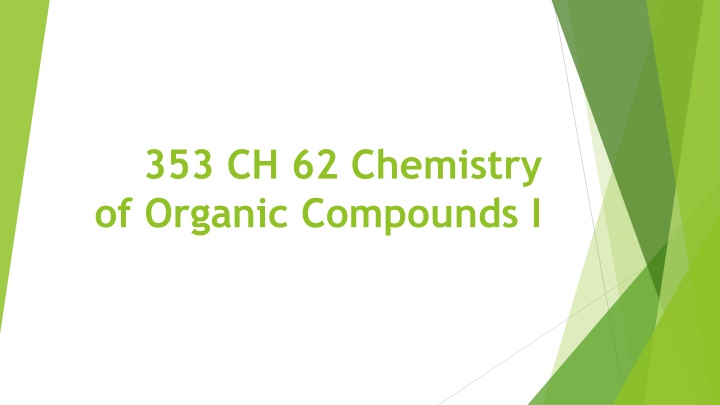
Chemistry of Organic Compounds: Understanding Hydrocarbons and Fuels
Explore the world of organic compounds focusing on hydrocarbons, their properties, occurrences, and uses. Learn about common fuels like LPG, CNG, LNG, and more derived from natural sources. Dive into the structural formulas, nomenclature, and essential characteristics of these vital chemical compounds.
Download Presentation

Please find below an Image/Link to download the presentation.
The content on the website is provided AS IS for your information and personal use only. It may not be sold, licensed, or shared on other websites without obtaining consent from the author. If you encounter any issues during the download, it is possible that the publisher has removed the file from their server.
You are allowed to download the files provided on this website for personal or commercial use, subject to the condition that they are used lawfully. All files are the property of their respective owners.
The content on the website is provided AS IS for your information and personal use only. It may not be sold, licensed, or shared on other websites without obtaining consent from the author.
E N D
Presentation Transcript
353 CH 62 Chemistry of Organic Compounds I
Course Objectives: The aim of the course is to provide detailed descriptions of the properties of organic compounds.
Learning Outcomes: By the end of the course the students are expected to be able to: Describe the occurrence and basic properties of organic compounds. Describe the structure, isomerism, nomenclature, preparation, reactions, physical properties and uses of hydrocarbons, aromatic compounds, organic halides, alcohols, phenols, ethers, epoxides, aldehydes, and ketones. To describe the stereochemistry of hydrocarbons.
Unit I: Occurrence, Classification and Basic Properties,Aliphatic Hydrocarbons
Organic Compounds: Occurrence Sources Reasons for Wide Occurrence
Identifying characteristics: Molecular formula CH4 Empirical formula (CH)n Structural formula CH3CH2CH2CH2CH3 Name methane, ethane etc.,
HYDROCARBONS The term hydrocarbon is self-explanatory which means compounds of carbon and hydrogen only. Hydrocarbons play a key role in our daily life. You must be familiar with the terms LPG and CNG used as fuels. LPG is the abbreviated form of liquified petroleum gas whereas CNG stands for compressed natural gas.
HYDROCARBONS Another term LNG (liquified natural gas) is also in news these days. This is also a fuel and is obtained by liquifaction of natural gas. Petrol, diesel and kerosene oil are obtained by the fractional distillation of petroleum found under the earth s crust.
HYDROCARBONS Coal gas is obtained by the destructive distillation of coal. Natural gas is found in upper strata during drilling of oil wells. The gas after compression is known as compressed natural gas.
HYDROCARBONS LPG is used as a domestic fuel with the least pollution. Kerosene oil is also used as a domestic fuel but it causes some pollution. Automobiles need fuels like petrol, diesel and CNG. Petrol and CNG operated automobiles cause less pollution.
HYDROCARBONS All these fuels contain mixture of hydrocarbons, which are sources of energy. Hydrocarbons are also used for the manufacture of polymers like polythene, polypropene, polystyrene etc. Higher hydrocarbons are used as solvents for paints. They are also used as the starting materials for manufacture of many dyes and drugs. Thus, you can well understand the importance of hydrocarbons in your daily life. In this unit, you will learn more about hydrocarbons.
ASHANTE WAIT FOR THE NEXT CLASS
